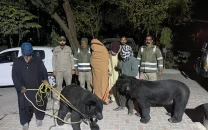Supplying power to Karachi
KESC respects its customers, uninterrupted power supply is possible if all stakeholders work for the national cause.

The imperative point is that we need a transition of mindsets at institutional, national and individual levels. Power supply management in Karachi is maintained by proper loadshedding schedules and categorisation of consumers is based on low, medium, high or very high-loss areas. The KESC maintains exemptions for loadshedding in various low-loss areas around the city and for sensitive places including industry, considering it to be our economy’s backbone. The KESC itself faces a shortage in the allocated 276 million cubic feet per day (MMCFD) gas quota by the authorities. The government committed to a $450 million, 560MW power plant, famously known as BQPS-II. However, an additional 130 MMCFD of gas to the new 560MW plant is in the larger interest of the common man. While a handful of industries enjoy the luxury of regular gas supply for captive power generation, the gas requirement of a public utility serving 20 million ordinary citizens of Karachi is being neglected despite firm written commitments.
Despite billions owed in dues by many entities, 183 government institutions enjoy uninterrupted power supply, including banks, hospitals, military, education, police departments and other institutions. As a gesture of facilitation for normalising water pumping to the city, KESC also often provides services on behalf of the Karachi Water and Sewerage Board despite the board’s own bulk supply service cable faults.
Stealing of wires, transformer neutral bushings, neutral lead, busbars, low tension leads and neutral phases lead to sudden power outages in the city. This has become an organised crime circuit in which well-structured thieves and copper buyers are involved.
To counter this, a number of PMTs and consumer connections were prolifically converted into a high tension ABC cable-based supply system in Clifton and Keamari — which mainly preempt illegal connections through kundas. Now, on average, a total of Rs3,552,914 is being saved every month and upcoming conversions of over 250 PMTs in various locations should bring remarkable value addition. Increased outages from seven to 10 hours in high loss areas are not due to loadshedding but faults due to overloading on PMTs and on a distribution system that has already caused that area a high loss. Areas with minimum losses are exempt from loadshedding, which includes 40 per cent of the total city area.
Recently, over 3,000 illegal connections from Baldia Town and other various areas were removed. Consumers are always guided on load regularisation, energy-efficient lifestyles and avoiding illegal connections. The KESC respects its customer base at institutional, commercial, industrial and residential levels and uninterrupted power supply will only be possible once all stakeholders work closely for the national cause.
Published in The Express Tribune, August 8th, 2012.



















COMMENTS
Comments are moderated and generally will be posted if they are on-topic and not abusive.
For more information, please see our Comments FAQ